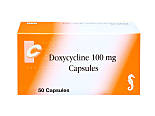Doxycycline
Order Consultation for Malaria Prevention Treatment


Doxycycline is a prescription-only antibiotic for malaria.
To place a prescription order for malaria treatment, fill in our brief questionnaire. There, you can choose a preferred treatment, such as Doxycycline. One of our doctors will review your information and assess what treatment is appropriate for you, taking into account your travel destination, purpose and duration of your trip. Your prescription will be delivered to a local pharmacy in Ireland or your home address. Alternatively, you can choose to have your medication delivered directly to your door.
A consultation for a malaria treatment prescription costs €21.50.



About Doxycycline
What is Doxycycline?
Doxycycline is a tetracycline antibiotic. It is taken before, during and after travelling to a risk area for malaria and provides effective protection from this dangerous infection. Doxycycline tablets are prescription medication, suitable for children over 12 years old, as well as adults. Before providing a prescription, your doctor will assess whether doxycycline is suitable for you and effective in treating the types of malaria prevalent in your travel destination.
Please note: malaria guidelines are regularly updated and countries receive new risk ratings for malaria. As a result, some of the malaria risk advice on our site may be out of date. Before starting your assessment for malaria treatment, please check Travel Health Pro guidance on the malaria risk in the country you’re travelling to.
The content on our website and our online assessment for malaria treatment are not intended as a substitute for a full travel consultation. It is important you discuss all precautions recommended for your trip with your GP or travel specialist – for example, you may need vaccines too.
How does Doxycycline work?
Doxycycline breaks the life cycle of the malaria parasite and works by preventing the production of Plasmodium proteins. As a result, the parasite’s reproduction is impeded and the infection cannot develop. In order to be effective, Doxycycline should be taken daily.
Good to know: As an antibiotic treatment with different dosing regimens, Doxycycline is also used to treat a range of other conditions, including traveller’s diarrhoea, skin infections and urinary tract infections.
Who can take Doxycycline?
Anyone travelling to an area where they could catch malaria should take anti-malaria tablets. To take Doxycycline, you need to be above 12 years old and not be pregnant or breastfeeding. Please consult the patient information leaflet with your medicine, for a full list of who should and who should not take Doxycycline.
How effective is the treatment?
Doxycycline is effective against all Plasmodium species, provided you follow the treatment plan. However, no anti-malaria medication is 100% effective, so make sure you take other preventative measures such as covering your body as much as possible, wearing insect repellent and using a mosquito net. If you experience any symptoms of malaria infection, such as fever, headache or nausea during your travels or within 4 weeks after, you should seek medical help immediately.
What do I need to know about Doxycycline and alcohol?
Doxycycline is effective against all Plasmodium species, provided you follow the treatment plan. However, no anti-malaria medication is 100% effective, so make sure you take other preventative measures such as covering your body as much as possible, wearing insect repellent and using a mosquito net. If you experience any symptoms of malaria infection, such as fever, headache or nausea during your travels or within 4 weeks after, you should seek medical help immediately.
Do I need to finish the course?
You should continue the course of treatment for 4 weeks after you have left the risk area. As you can’t be sure that you haven’t been infected with malaria, you should complete your course of Doxycycline to avoid developing a potentially dangerous illness after your trip.
What are the advantages of taking Doxycycline?
Doxycycline is taken daily, unlike other malaria treatments such as Larium (which is taken on a weekly basis). Some people prefer the daily intake and find it easier to remember taking the tablets as a part of their daily routine. Doxycycline is highly effective against all types of Plasmodium and is a good option for those travelling to high-risk malaria areas.
What do the tablets look like?
The 100 mg Doxycycline tablets are white, have an oval shape, and contain yellow pellets. You can obtain a prescription for your tablets from a reliable source such as ZAVA Ireland. We can deliver your prescription to a registered local pharmacy in Ireland which provides licensed Doxycycline tablets containing the correct dosage of the active ingredient. Buying from unverified sources online puts you at risk of taking unlicensed medicines, which could harm your health and may fail to protect you from malaria.
How do I take Doxycycline?
You should take one 100mg tablet per day, beginning 2 days before you enter an area where the illness is prevalent. You should continue the treatment throughout your stay and for a further four weeks after you have returned to a malaria-free area.
If you miss a dose, take it as soon as you remember. However, if this is near the time of your next dose, you should miss the skipped dose and continue taking the next dose as usual. You should try to avoid missing doses, as it decreases your protection. If you vomit or have diarrhoea within an hour or two of taking the tablet, you should take a repeat dose, as it is likely that the Doxycycline has not been absorbed into your bloodstream.
If you experience stomach pain when taking doxycycline, you can take your tablet with food. You should take your daily doxycycline tablet at least half an hour before lying down or going to bed to minimise the risk of stomach irritation and nausea.
You should take Doxycycline 2-3 hours before or after taking products containing aluminium, calcium, iron, magnesium, zinc or bismuth subsalicylate (such as antacids, didanosine, quinapril, vitamin and mineral tablets, dairy products and calcium-enriched juices). These may bind to Doxycycline and prevent your body from properly absorbing the drug.
What does Doxycycline contain?
The active ingredient is Doxycycline in the form of Doxycycline Hyclate. The standard dose for preventing malaria is 100 mg per day, given in 1 tablet.
Doxycycline Side Effects
Common Doxycycline side effects include:
- skin rash
- flaking of the skin
- skin sensitivity to sunlight
- severe headaches
- blurred vision
- inflammation and ulcers of the gullet
- blood disorders
- worsening of Systemic Lupus Erythematosus (SLE)
Uncommon Doxycycline side effects include:
- upset stomach
- vomiting
- nausea
- diarrhoea
- difficulty swallowing
- sore tongue and mouth
- loss of appetite
- rectal or genital itching
Rare Doxycycline side effects include:
- discolouration of thyroid tissue
- bowel and liver inflammation
- teeth discolouration and in children, underdevelopment of teeth
- inflammation of the membrane around the heart
If you experience any of these side effects, or any others, please speak to your doctor.
Do not take Doxycycline if you:
- are under 12 years old
- are pregnant
- are breastfeeding
- have liver problems
- are allergic to tetracycline antibiotics
- have Systemic Lupus Erythematosus (SLE)
- have hereditary problems of fructose intolerance
- have glucose-galactose malabsorption
- have sucrase-isomaltase deficiency
You should not take Doxycycline if you take:
- Warfarin
- Penicillin type drugs
- Barbiturates
- Carbamazepine or phenytoin
- Methoxyflurane
- certain retinoids
- Digoxin
- Lithium
- Diuretics
You should consult your doctor before taking Doxycycline if you:
- have liver problems
- are taking drugs which may affect liver function
- have Myasthenia Gravis
- take antacids
If you are on a course of antacids or iron preparations, but also need to take Doxycycline during your course, this is possible. Just make sure you take the tablets at different times of the day.
You should also be aware that taking Doxycycline while taking contraceptive pills can make the anti-malarial treatment less effective. Be sure to use extra contraceptive protection.
Doxycycline should not affect your ability to drive or operate machinery. However, if you feel drowsy after taking your tablets, do not carry out these activities.
You should not take Doxycycline for longer than a year.

Babak studied medicine at King’s College London and graduated in 2003, having also gained a bachelor’s degree in Physiology during his time there. He completed his general practice (GP) training in East London, where he worked for a number of years as a partner at a large inner-city GP practice. He completed the Royal College of GPs membership exam in 2007.
Meet our doctorsLast reviewed: 21 Mar 2023
